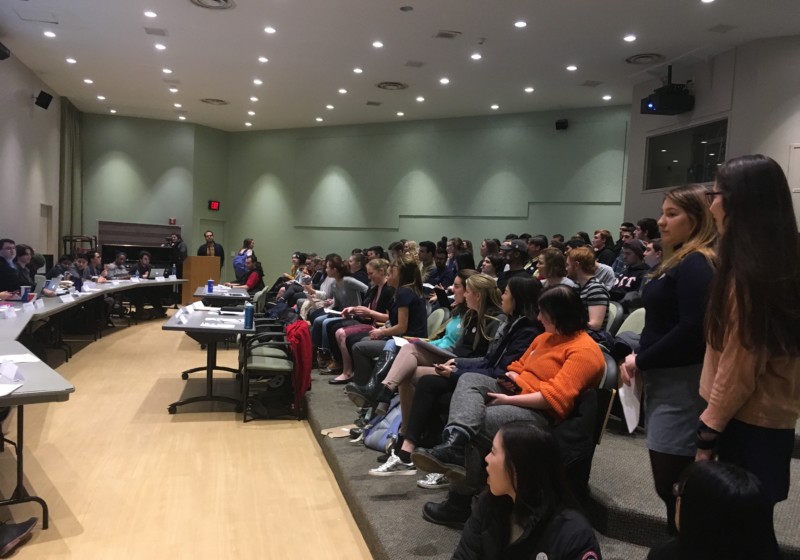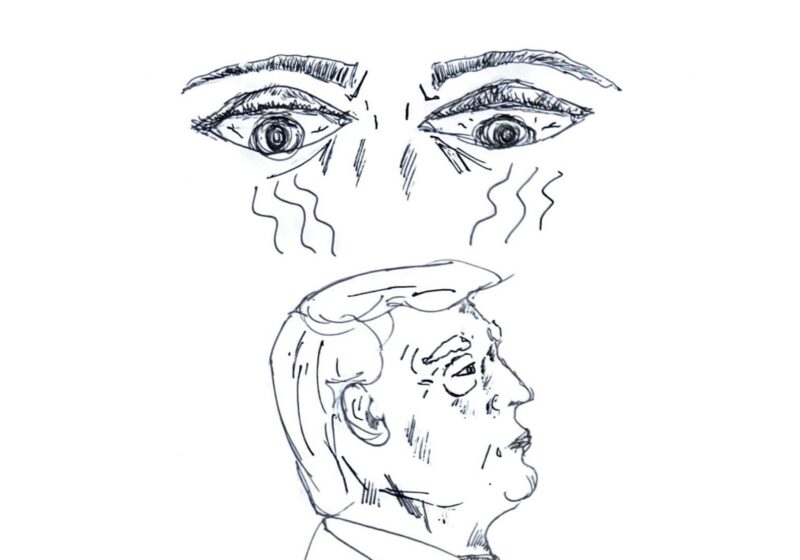Accountability within SA Government is a pipe dream. That became jarringly clear this past week, when the Senate voted in secret to, for all we know, kill a club.
The meeting’s specific situation was questionable enough. Siding with its appropriations committee, Senate voted not to offer a financial exception to the UR Equestrian Team, which over the years has taken up far more of the club sports budget than any other group (22 percent, at around $17,850) and is exceeding caps set this past fall for all teams. An exception to either the amount individual members pay in dues, or to the subsidy from SA, appeared to have been the club’s only lifeline, and the future of a competitively successful, 26-year-old, 35-member team is now unclear. Without the level of funding it needed, and the caps excused for the near future, the team says it will struggle to survive. So far, we have no reason to believe otherwise.
Why did the appropriations committee want Senate to reject the exception? It said the money could be better used for uniforms for other teams and a dedicated club sports adviser. We are curious to hear how that sits with other members of the club sports community. But readers should research that situation in full and come to their own conclusions.
The broader issue is how Senate, its leadership, and officials from other branches handled the decision.
Two senators left during the meeting. The final motion on this decision failed by one vote. Even if the outcome wouldn’t have changed, it was irresponsible of the Senate to operate incompletely during a night of such obvious importance to a passionate group of students. You don’t often see the kind of turnout — over 100 people in the room — that last week’s meeting garnered. They deserved a full Senate, and deliberations could only have benefited from more voices at the table. At least one of those senators left for important personal reasons, which is understandable. We just wish everyone had been there.
Most outrageous was the Senate leadership’s decision — which was supported by leaders from other branches of SA Government, including the chief justice of the All-Campus Judicial Council — to keep the voting on this question secret. Senators wrote their votes on paper, and the votes were tallied. That is not normal. No one was allowed to know who voted for what, and given Senate’s cloistered track record, it’s likely no one ever will.
How can a representative government function if, on the issues that matter most, students are barred from knowing whether their senators are really representing them? It works the same way with a town council: The public looks at what its representatives did and is then able to make an informed decision at the polls — did Representative X serve me well when they voted for legislation A? Were they acting in my best interest when they voted against legislation B? And so on.
SA leaders have defended this decision by saying they were protecting senators against possible harassment, as if accountability and preventing harassment are mutually exclusive paths. Senators should take responsibility for the decisions they make, especially ones that affect students as significantly as this. If that results in students harassing them, there are obvious means to address that. The possibility of harassment happening hardly justifies such craven governance. Besides, public scrutiny and backlash is an assumed risk of taking office — which doesn’t mean people should bully their representatives, but it’s not unreasonable to expect students to be angry when they feel their government is failing them. The excuse peddled by some SA officials — “It’s different! These are their peers!” — is naive and neglects the responsibility that comes with a government of any kind. When you accept that kind of power and responsibility, you must put aside personal relationships. If a club gets killed by SA, directly or indirectly, its members and fans deserve to know who helped pull the trigger.
In opting to duck accountability last week, the Senate’s leadership robbed students of a common-sense right. In not speaking up when the secret ballot was introduced, the senators acted as accomplices. That this essential function of representative government was cast aside is shameful. Our leaders have pocketed the public’s trust and said, “See ya!”
That’s why it’s up to students outside SA. Over the years, the Editorial Board has encouraged students to hold their leaders accountable, as we have tried to do ourselves. Most students probably haven’t cared — some readers even say they hate seeing so much about SA in the paper. But this situation highlights exactly what happens when less than half the student body votes in SA elections and when just as many students — or even more — don’t pay attention to SA between those elections.
What happened to the Equestrian Team could happen to the group you hold dear. SA has real power over your group’s success — its funding, its rules, its existence. This case shows how SA can abuse that power. It shows how, when not aggressively checked by its constituents, SA can and will do things it shouldn’t. This wasn’t an example of violated ideals or ceremonial actions — this was a real decision with visceral consequences.
When the spring elections come around, voters should take a hard look at any candidates who are running for re-election to the Senate or who are gunning for the presidency. They should think of what happened last Monday, decide whether their peers served them well, and cast their votes.
For us, this much is clear: If you have the gall to hurt a student group but not the guts to take responsibility for it, you aren’t who we want serving students.
Clarification (2/20/18): The initial version of this editorial said the secret vote was supported by both top justices of the All-Campus Judicial Council. The deputy chief was not involved in the actual decisionmaking. Rather, they only helped carry out the decision by counting votes. To enhance clarity, we’ve amended the language to only say it was supported by the chief justice.




